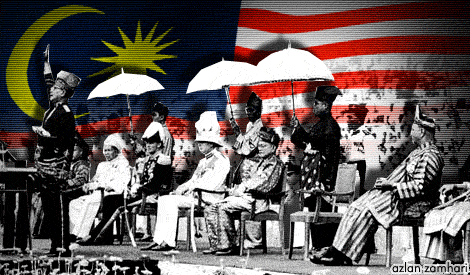
MP SPEAKS | In Part 1 of this article, I draw attention to the convergence of five factors creating a condition primed for the “perfect storm” of ethnic conflict.
In Part 2, I caution that the Bersatu-Umno/PAS contention for Malay supremacy in the prevailing politically charged atmosphere may push ethnic-religious tensions beyond the tipping point, triggering ethnic strife, hostilities, or worse, conflict.
In this Part 3, I suggest that in order to pull the masses away from political entrepreneurs using the “race and religious card” to mobilise support, the Pakatan Harapan government must deliver tangible economic results and counter the Umno/PAS narrative on racial politics. This is by exposing the myth of race and to rebuild Malaysia as a shared society. There is no other alternative.
Rekindling the sense of shared identity
We must break the vicious cycle of resentment, intolerance, bigotry and hate. This only leads to our society’s disintegration. We must promote the virtuous circle of inclusive growth, build trust amongst the different races and rekindle the sense of shared identity.
When Malaysia was born, she was held out before the world as an example of a multiracial society living in peace, harmony and tolerance.
Tunku Abdul Rahman in the Proclamation of Independence of the Federation of Malaya called on all citizens “to work to strive with hand and brain to create a new nation, inspired by the ideals of justice and liberty - a beacon of light in a disturbed and distracted world”.
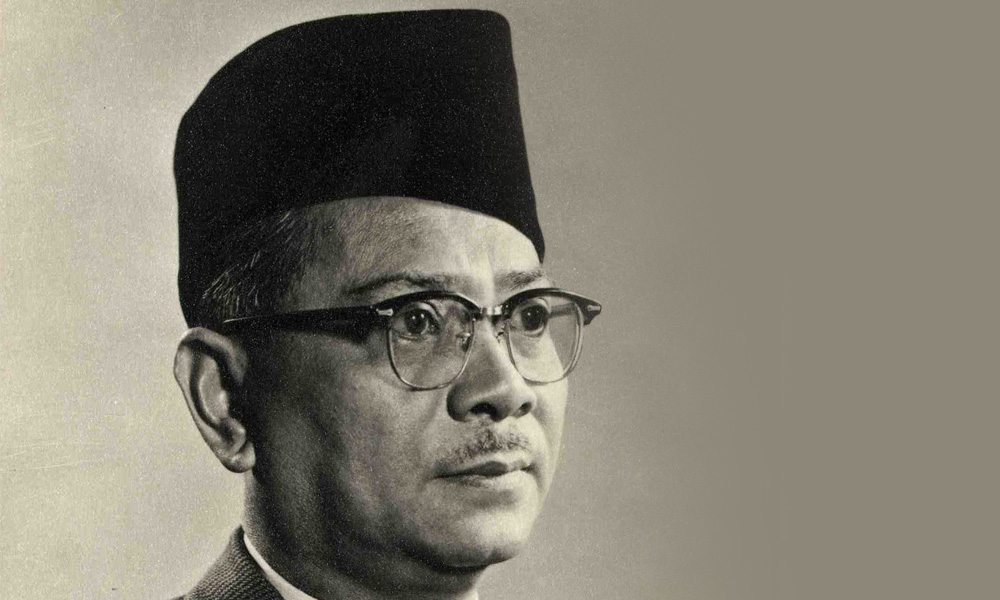
Six years later in his Malaysia Day speech, Tunku said 10 million people of many races in all the states of Malaya, Singapore, Sarawak and Sabah joined hands in freedom and unity to realise the ideal of a shared society. He said:
“The Federation of Malaya now passes into history. Let us always remember that the Malayan nation was formed after many difficulties during a long period of national Emergency, yet its multiracial society emerged, endured and survived as a successful and progressive nation, a true democracy and an example to the world of harmony and tolerance.
"As it was with Malaya, so it can be with Malaysia. With trust in Almighty God, unity of purpose and faith in ourselves, we can make Malaysia a land of prosperity and peace.
"In doing so, let every Malaysian in all the states of Malaya, Singapore, Sarawak and Sabah ensure that our Malaysia is truly worthy of the aims and hopes we have shared, the trials and stress we have endured, in working together to achieve our common destiny.”
Shared society
A shared society is one which is socially cohesive, stable, safe and just. A shared society is one in which all peoples of different races are equally capable for participation in and reaping the benefits of economic, political and social opportunities. One in which citizens have a sense of belonging and are empowered to participate without necessarily conforming to a dominant culture.
A shared society is one which is at ease with itself and the diversity of its members’ cultural, religious and ethnic identities. A society that recognises and values these identities and their interdependence as strengths, working creatively with each other to promote respect for human dignity and release human potential.
Fifty years after Tunku’s pronouncement of Malaysia as a shared society, 75 current and former heads of states and governments of 54 countries pledged their commitment to promote the concept of a shared society as a key priority for the world today.
The leaders declared that there is no other option if we are to avoid a world continually wracked by identity-based tensions, inter-community divisions, inequality and injustice.
If we are not able to accept differences and to learn to understand the unfamiliar in others and are not helped to engage with others, barriers are created between people and communities which fester and lead to disintegration with devastating consequences.
While the rest of the world learned to appreciate the concept of a shared society, we in Malaysia discarded it. Somewhere along the road the ideals upon which Malaysia was established were ejected and lost. They were replaced by harsh and intolerant racist ideas. The fabric of our society is now threatened by social fractionalisation and social exclusion.
New Malaysia under Pakatan Harapan must return to its founding vision. The Harapan government, our leaders, civil society and the people must work to reset our nation to the ideals of the shared society upon which Malaysia was established.
The ebbing economic tide
Firstly, the Harapan government must deliver early tangible economic results. There is a saying that “a rising tide lifts all boats”. The opposite is equally true - “an ebbing tide sinks all boats”. The ebbing economic tide has already sunk the BN boat in GE14. Unless immediate action is taken, it can also sink the Harapan boat.
Prime Minister Dr Mahathir Mohamad has unveiled a new economic model which advocates shared prosperity. Before we can have shared prosperity, we must first have a shared society. More importantly, it is only by putting money back in people’s pockets that will reduce the tension and return the voters’ confidence back in Harapan.
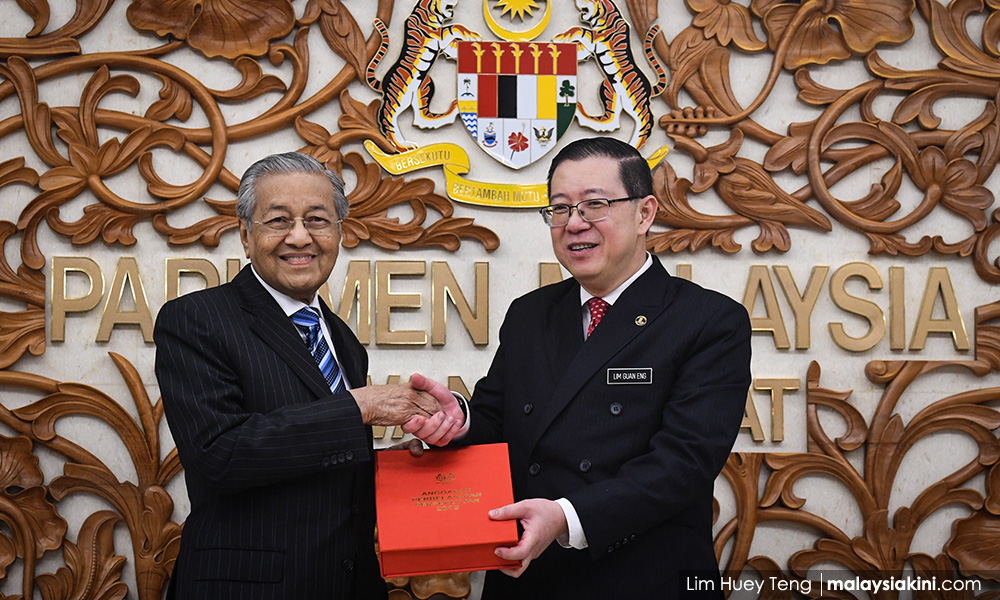
Despite the cash-strapped legacy of the previous regime, the Harapan government must resist implementing austerity measures. When the market is lacklustre, the government needs to introduce stimulus and incentives to make it vibrant again. Economist Paul Krugman said, what fiscal policy should do: it should support demand when the economy is weak, and it should pull that support when the economy is strong. As John Maynard Keynes said, “the boom, not the slump, is the right time for austerity”.
A stimulus package is required to act as a catalyst for economic activities. Higher public investments in infrastructure projects, technology and education will both revive demand and alleviate inequality. This will boost growth in the long-run and in the short-run. With the East Coast Rail Link (ECRL) back on track, the High-Speed Rail (HSR) should also be reviewed together with other infrastructure projects that were suspended or pending re-negotiations. This will act as a catalyst for the construction sector.
Bank Negara should review the responsible lending guidelines. Since its introduction, the property market has been affected by banks rejecting purchasers’ loan applications. This review is necessary to revive the property, building and construction industry which is an important sector of the economy.
Capturing the narrative
Secondly, the Harapan government must counter the Umno/PAS rhetoric. Proactive communication is required to build public understanding and support. The Harapan government must capture the narrative – by articulating a compelling vision of hope, develop a sense of shared identity, generate broad popular buy-in and mobilise citizens.
The Harapan government needs to re-define citizens’ expectation, to move them beyond negative frames of reference and to transform public policies and institutions to address immediate and long-term sources of discord.
Citizens who lack credible information about progress made and challenges ahead will likely attribute the lack of visible improvements to a lack of political will and they will lose confidence in those they believed and elected. They may even turn against Harapan which may have probably happened in the three recent by-elections.
There is no race, only racism
Thirdly, the narrative must deal with hard truths. Harapan must stop living a BN lie by playing up racial politics.
The government must debunk the myth that intelligence, indolence, racial superiority or inferiority are inherited traits due to genetic or biological causes.
There is no scientific basis for race. There is only racism which is a social construct. “Social construct” means an idea that has been created and accepted by the people in a society. Since racism is learned it can also be unlearned.
The American Association of Physical Anthropologists (Aapa) in March this year released an update of its 1996 statement on race and racism. The Aapa's updated statement confirms that humans are not divided biologically into distinct continental types or racial genetic clusters.
Instead, the Western concept of race must be understood as a classification system that emerged from and in support of European colonialism, empire and slavery. It does not have its roots in biological reality. The racial classification has long served Europeans to justify economic exploitation, oppression, discrimination, institutional racism, dispossession, displacement and genocide.
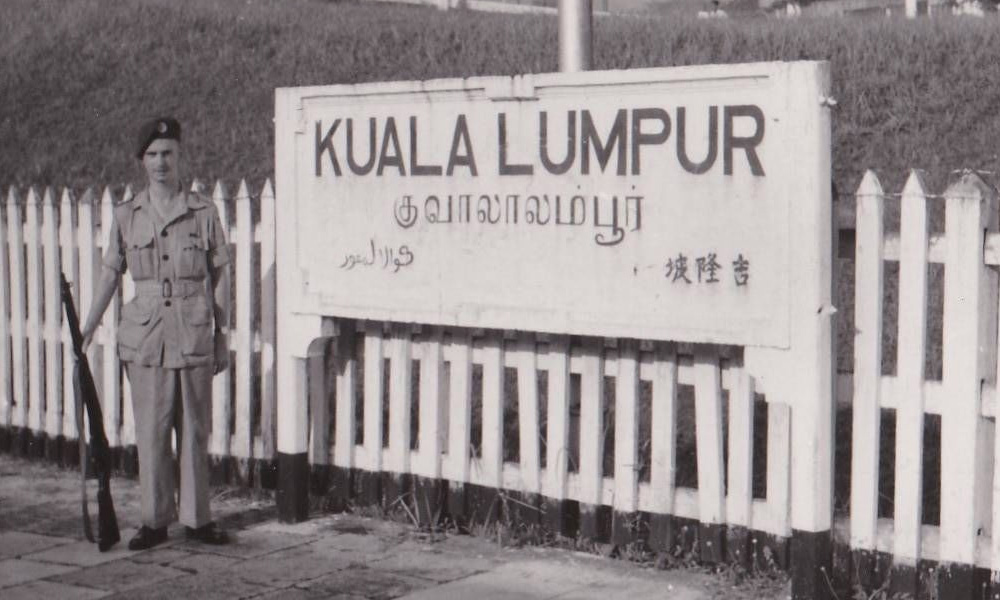
The Aapa updated statement says that:
“The concept of race has developed hand-in-hand with racist ideologies over the last five centuries, and biological and anthropology have played an important role in the creation and perpetuation of both race concept and racist ideologies. Racist political doctrines should not receive support from scientific endeavours, but in practice, racism has been co-constructed with inaccurate depictions of human variation provided by scientists.
"Over our history, the Aapa, and many of its members have been complicit in producing and reifying racist ideologies via misuse, falsification, or biased production of scientific information. We acknowledge this history and stress that we should not paper over it even as we seek to end these practices and prevent re-emergence of misconception about race in the future.”
The Aapa updated statement referred to the results of DNA and human genome research. Humans share the vast majority (99.9 percent) of our DNA. Individuals nevertheless exhibit substantial genetic and phenotypic variability, including individuals in the same community. No group of people is, or ever has been, biologically homogeneous or “pure.” Both the genomic and phenotypic variation that exists reflects the fact that all humans living today belong to a single species, Homo sapiens, and share common descent.
The Harapan government ought, like Aapa, acknowledge that race is a myth and that race and racism are social-constructs that must be addressed.
Expelling internalised colonial stereotypes
Fourthly, the Harapan government must expel from the psyche of Malaysians the internalised colonial stereotypes. In many former colonies, the anti-colonial nationalists were engaged not only in a struggle for political and economic freedom but also a cultural resistance movement of colonised people against white racism and European imperialism.
The anti-colonials were well aware the colonial powers had violently transgressed the colonised their own cultures and identities. The colonisers imposed through the force of arms and military might, “ethnocentrism”, the belief in the superiority of their own people and culture.
The colonisers sought to justify their imperialism by the use of pseudo-scientific arguments such as Social Darwinism, racists ideologies of “White Supremacy” and the “White Man’s Burden” of divine manifestation to rule the lesser mortals who are too stupid and lazy to govern themselves. Over time, the colonisers’ stereotypes were accepted and internalised by the colonised.
Thus, the anti-colonial nationalists’ fight for independence was also a struggle of the peoples to reclaim their authentic self and their own individual dignity and self-worth. These independent movements were more or less successful in overcoming colonial construction of ethnic identity and religious differences among the colonised peoples. This was not done by the Alliance and BN.
Umno and its component parties, due partly to historical causes and more particularly for political expediency, chose to construct “nationalism” based on racial differences. The Alliance and its successor BN perpetuated the colonial stereotypes of “the lazy Malay”, “the venal Chinese” and the “the cringing and cheating Indian”.
Following independence, although the country was freed from external colonisers, the people were still shackled by the internal colonisers’ perception of their own people.
Umno and its Alliance partners saw their own people in the same way their colonial masters did. They assumed as natural the colonial constructed ethnic differences and negative stereotypes. They propagated an ethno-nationalist political strategy designed to secure ethnic privilege based on the colonial stereotypes of themselves and of the other ethnic groups. This has continued to this day.
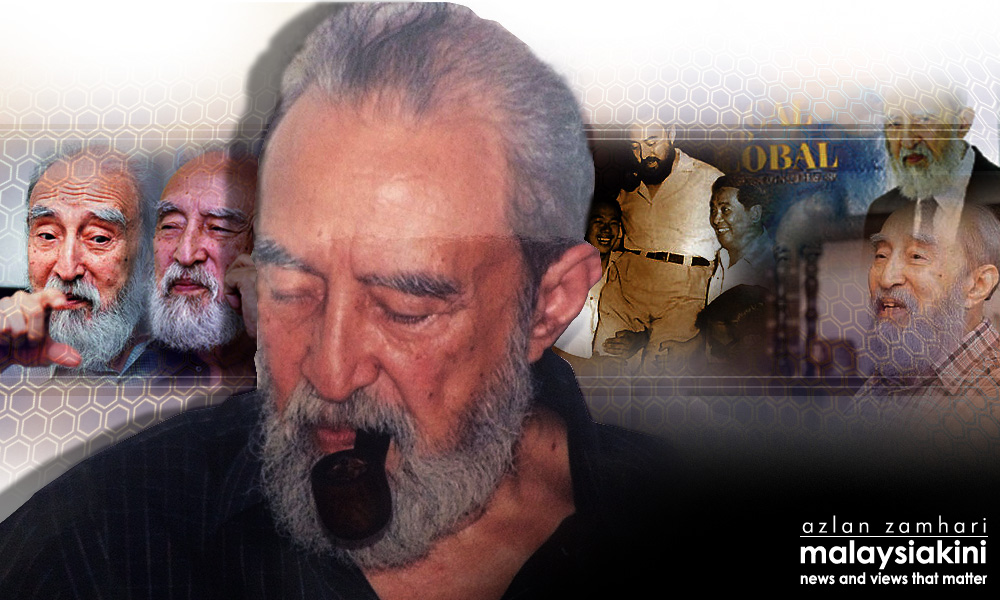
Syed Hussein Alatas has called on these colonial stereotypes to be corrected in his book, The Myth of the Lazy Native. He said from the point of view of modern scientific standards the negative portrayals of the Malay character in the 1971 Umno book entitledRevolusi Mental are unsound and naïve. These stereotypes are dangerous since they influenced practical politics in Malaysia.
Syed Hussein described Revolusi Mental as a distorted ideology of a Malay ruling party sharing the false consciousness of colonial capitalism. The false consciousness distorts reality. The Malay ruling party inherited the rule from the British without a struggle for independence such as that which took place in Indonesia, India and the Philippines.
As such, there was no ideological struggle. There was no intellectual break with British ideological thinking at the deeper layer of thought. The type of distortion in the Revolusi Mental on the Malay character is the result of fallacious reasoning. The 30 or more negative traits of the Malay character are conclusions derived from false premises.
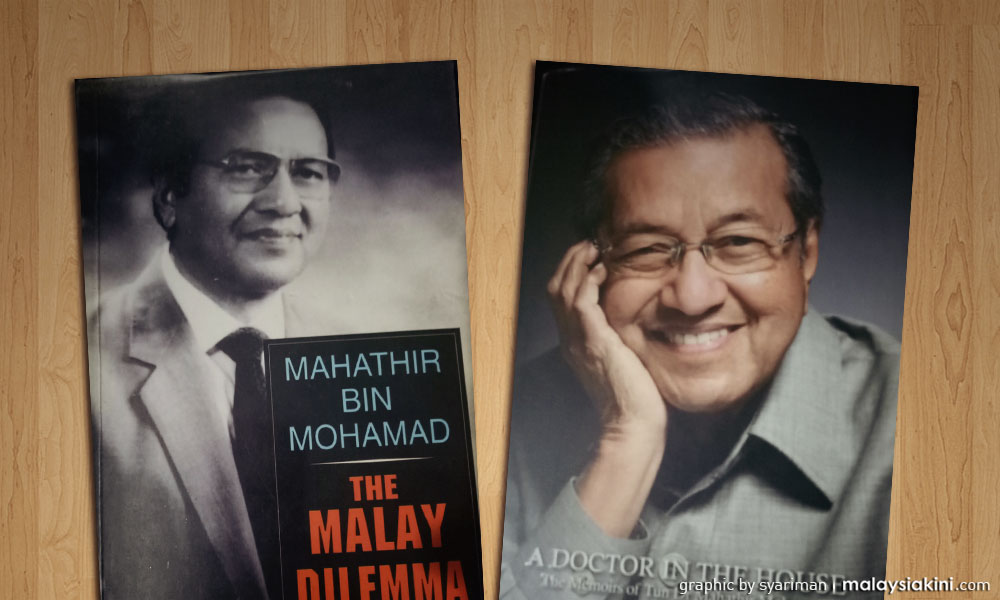
Syed Hussein also took issue with Mahathir’s The Malay Dilemma. He was of the opinion that although The Malay Dilemma is critical of the colonial rule fostering divisions among groups, Mahathir did not deal with the socially constructed nature of the racial or ethnic identities, attributing it instead to a biological given.
Mahathir’s main argument rests on the assumption of fact or self-evident truth regarding the “natural” ethnic difference and conflict between Malay and non-Malay (Chinese). These understandings were not only Mahathir’s but were also subscribed to by many of the nationalists of his generation.
It appears from Mahathir’s speeches in the Future of the Bumiputera and Nation Congress 2018 and Bersatu second annual general meeting that he still holds the same views as he did when he wrote The Malay Dilemma. In his Bersatu second AGM speech, he said Malays cannot continue depending on the government for economic and financial aid in perpetuity:
“For the weak, a crutch might help, but this sort of help should not be sustained. When our strength returns, the crutch must be let go.”
He said that although the New Economic Policy (NEP) had some success, it had yet to fulfil its aim to close the income disparity between the bumiputera and the other races.
Mahathir still sees the income and wealth inequality gap between the Malays and non-Malays as due to inherent weaknesses of the Malay character and not due to crony capitalism, state capture and corruption by the political elite.
Unfortunately, it appears ministers such as Maszlee Malik are also labouring under the same colonial stereotypes. This is revealed by his recent comment that the matriculation quota must be maintained because the non-bumiputera are rich and are able to send their children to private universities. The remark was most insensitive to the plight and sacrifices of the non-bumiputera middle and lower classes.
They are already stretched and stressed by the rising costs of living and reducing the purchasing power of their income. They have to save, scrimp and borrow to send their children to the local private institutions because of the quota system for public university admissions. The remark also revealed ministers like Maszlee may, in continuing BN policies and programmes, have not fully considered the actual facts and figures to separate fact from fiction.
A 2015 parliamentary reply from the Economic Planning Unit (EPU) disclosed that:
• Bumiputeras is the largest group of the country’s top 20 percent income earners (T20) at 53.81 percent, Chinese (37.05 percent), Indians (8.80) percent and others 0.34 (percent).
• The bumiputeras also form the largest group in the middle 40 percent income earners (M40) at 64.17 percent, Chinese (26.43 percent), Indians (9.10 percent) and others (0.30 percent).
• The bumiputeras also form the largest group in the bottom 40 perent income earners (B40) at 73.61 percent, Chinese (17.50 percent), Indians (8.52 percent) and others (0.36 percent).
The British left Malaya 62 years ago but the colonial stereotypes of different racial identities have persisted. In the era of New Malaysia, it is time to exorcise the ghosts of our colonial past and build a future based on a truly inclusive Malaysian identity.
Political patronage and elite capture
Fifthly, the narrative must provide clear evidence-based reasoning with complete data that a change in the affirmative action policies are required to correct flaws and deficiencies. The NEP and Bumiputera Agenda have been abused by the political elites.
They have in the course of securing personal gains through political patronage, rent-seeking activities, corruption and state capture deprived the intended deserving Malays of the benefits of the affirmative action policies. They caused policies of social fragmentation and social exclusion to be implemented to maintain their hold on power.
The Harapan government should let the truth be known by providing evidence of these abuses. For example, the number of graduates who defaulted in repayment of their National Higher Education Fund (PTPTN) loans who are blacklisted and banned from travelling out of the country. This should be compared with the evidence of the political-economic elite who defaulted in the billions they borrowed and were bailed out.
The Harapan government should also reveal the data of the bumiputera implementing agencies (BIAs) such as Majlis Amanah Rakyat (Mara), Tekun National Foundation (Tekun), Amanah Ikhtiar Malaysia (AIM), the SME Bank and others of the bumiputera “entrepreneurs” with ties to the political elite who have received both financing and rents. They have acted as a restraint on genuine bumiputera entrepreneurs’ development.
The BIAs have been propping up weak bumiputera entrepreneurs or business cronies who were the beneficiaries of contracts and rents provided by political leaders. “[Such crony bumiputera entrepreneurs] believed that once given, the assistance need not be repaid, and they were not required to abide by the terms and conditions of the loan agreements.”
The truth has to be told so that the masses are informed they are being used for the political entrepreneurs’ personal interests.
Social cohesion: All men are brothers
Sixthly, the Harapan government must take concrete steps to build an inclusive society and should not follow BN in only giving lip service to slogans such as “unity in diversity” but on the ground used Biro Tatanegara (BTN) to conduct courses to promote racism and encourage hate towards the opposition.
The Harapan government should begin with the concept that “all human beings are born free and equal in dignity and rights. They are endowed with reason and conscience and should act towards one another in a spirit of brotherhood”.
There must be equity in the distribution of wealth and resources. How resources are allocated will affect the orientation of the society, either towards a more integrated, inclusive society or an exclusive, polarised and disintegrated one.
Socio-economic policies should be geared towards managing equitable distribution and equal opportunities. Inclusive policies, instructions and programmes that are sensitive to and cater to the less advantaged and vulnerable need to be put in place.
Effective Leadership
Seventhly, the Harapan government must show effective leadership to drive social inclusion and building a shared society. The prime minister and cabinet must take ownership and be committed to resetting Malaysia as a shared society.
In the past year, only a few leaders have spoken out against the misconceptions of race and racial differences. Former finance minister Daim Zainuddin in his speech said that Malays should not labour under a siege mentality. Prime minister-in-waiting Anwar Ibrahim has repeatedly assured the Malays that they have nothing to fear while maintaining that social justice demands the poor and needy of the other races to also be provided for.
The NEP and Bumiputera Agenda are based on social justice and equity. Effective leaders know it is better to appeal to the peoples’ better angels than to secure compliance by the use of the state’s coercive powers. As human beings, we are endowed with a moral sense, an intuitive feeling for what is right and wrong. Morality has, in a sense, a voice within.
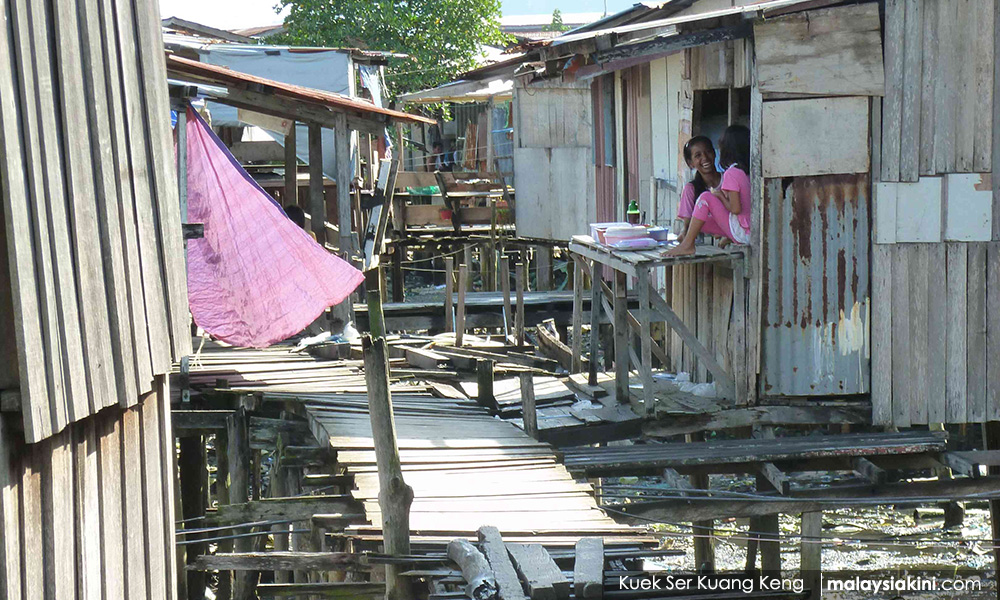
We know it is injustice when an Indian or Chinese student with 9As from a B40 family is not given a matriculation seat. It is injustice when those in need are denied while the government’s resources are poured to make a billionaire richer by several billion ringgit more.
Just as equity demands bumiputera economic deprivation ought to be relieved so does equity demands the Indians’ plight be resolved. The conversion of plantations into industrial estates and new townships had led to the displacement of hundreds of thousands of Indian estate workers - “they not only lost their jobs but also housing, basic amenities, socio-cultural facilities and community support structures”. These have led to a host of social problems such as broken families, poor housing, unemployment, violence, gangsterism, destitution, vagrancy and drug abuse.
Just as equity demands assistance and aid ought to be given to the bumiputera rural and urban poor so does equity demands the plight of the Orang Asli and bumiputera minorities in Sabah and Sarawak be addressed. While the national poverty rate in 2012 is 1.7 percent, it is 76.9 percent for the Orang Asli, Muruts at 56.1 percent in Sabah, and Penans at 65 perent in Sarawak.
Urgent action is required to address the five factors creating the conditions for ethnic conflict and to pre-empt the political entrepreneurs’ design in order to avert racial-religious strife and conflict. We must all pull back and move away from the brink of disaster.
To maintain peace and prosperity our leaders from both the Harapan government and the opposition, civil society and our citizens must recognise the value of diversity. Malaysians need to find a way to build a society based on shared goals and common values. The only effective, sustainable and morally acceptable way to manage the social tensions is to create a shared society in which all members of our society feel at home and are valued for who they are.
Economic growth and the well-being of everyone and our nation can only flourish when we learn to manage our diversity for the betterment of all Malaysians, not just a selected few. The wisdom of Mahatma Gandhi would be an appropriate reminder to all of us: “The world has enough for everyone’s need, But not enough for everyone’s greed.”
WILLIAM LEONG JEE KEEN is the PKR member of parliament for Selayang. - Mkini


No comments:
Post a Comment
Note: Only a member of this blog may post a comment.